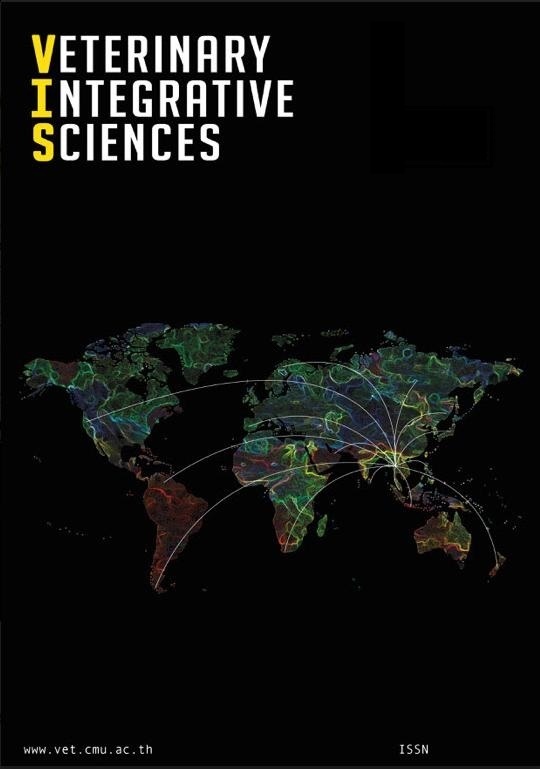Understanding the local molecular epidemiology of Mycoplasma hyopneumoniae from pig herds in northern-Thailand
Main Article Content
Abstract
Mycoplasma hyopneumoniae, a causative agent of Enzootic pneumonia (EP), is one of the most important issues contributing to economic losses in swine industry. A study of their genetics can further an understanding of its epidemiology assisted in developing the control strategy. Multilocus sequence typing (MLST) is widely accepted as a tool for this type of determination. In this study, 15 local strains of M. hyopneumoniae were isolated from consolidated lungs of slaughtered pigs in Chiang Mai and Lamphun provinces between 2018 and 2019 and genotyped by MLST. The variations of three housekeeping genes, adk, rpoB and tpiA were explored to query the specific sequence types (STs). Eleven STs were determined. Nine (ST135–ST143) were assigned as newly detected STs. The remaining two were ST117 and ST106. Of those strains recently detected, only one identified as ST106 was similar to others previously found by locals; ten STs recently investigated had not previously been found. New strains were carried by newly acquired pigs, and a high rate of overall mutation was emerged in a short period of time. The hygienic quarantine and disease detection, especially in pigs introduced to the region, should be taught and implemented in field practices.
Article Details

This work is licensed under a Creative Commons Attribution 4.0 International License.
Publishing an article with open access in Veterinary Integrative Sciences leaves the copyright with the author. The article is published under the Creative Commons Attribution License 4.0 (CC-BY 4.0), which allows users to read, copy, distribute and make derivative works from the material, as long as the author of the original work is cited.
References
2. Brown, R.J., Holden, M.T.G., Spiller, O.B., Chalker, V.J., 2015. Development of a Multilocus sequence typing scheme for molecular typing of Mycoplasma pneumoniae. J. Clin. Microbiol. 53, 3195-3203.
3. Fano, E., Pijoan, C., Dee, S., 2005. Dynamics and persistence of Mycoplasma hyopneumoniae infection in pigs. Can. J. Vet. Res. 69, 223-228.
4. Kuhnert, P., Overesch, G., 2014. Molecular epidemiology of Mycoplasma hyopneumoniae from outbreaks of enzootic pneumonia in domestic pig and the role of wild boar. Vet. Microbiol. 174, 261-266.
5. Makhanon, M., Tummaruk, P., Thongkamkoon, P., Thanawongnuwech, R., Prapasarakul, N., 2012. Comparison of detection procedures of Mycoplasma hyopneumoniae, Mycoplasma hyosynoviae, and Mycoplasma hyorhinis in lungs, tonsils, and synovial fluid of slaughtered pigs and their distributions in Thailand. Trop. Anim. Health Pro. 44, 313-318.
6. Mayor, D., Jores, J., Korczak, B.M., Kuhnert, P., 2008. Multilocus sequence typing (MLST) of Mycoplasma hyopneumoniae: a diverse pathogen with limited clonality. Vet. Microbiol. 127, 63-72.
7. Michiels, A., Vranckx, K., Piepers, S., Del Pozo Sacristán, R., Arsenakis, I., Boyen, F., Haesebrouck, F., Maes, D., 2017. Impact of diversity of Mycoplasma hyopneumoniae strains on lung lesions in slaughter pigs. Vet. Res. 48, 2. https://doi: 10.1186/s13567-016-0408-z.
8. Otake, S., Dee, S., Corzo, C., Oliveira, S., Deen, J., 2010. Long-distance airborne transport of infectious PRRSV and Mycoplasma hyopneumoniae from a swine population infected with multiple viral variants. Vet. Microbiol. 145, 198-208.
9. Paisley, L.G., Vraa-Andersen, L., Dybkjaer, L., Møller, K., Christensen, G., Mousing, J., Agger, J.F., 1993. An epidemiologic and economic study of respiratory diseases in two conventional Danish swine herds. II: Associations between lesions present at slaughter and mean daily gains during specific intervals of the growth period. Acta. Vet. Scand. 34, 331-344.
10. Patchanee, P., Eiamsam-Ang, T., Vanaseang, J., Boonkhot, P., Tadee, P., 2017. Determination of regional relationships among Salmonella spp. isolated from retail pork circulating in the Chiang Mai municipality area using a WGS data approach. Int. J. Food Microbiol. 254, 18-24.
11. Sibila, M., Pieters, M., Molitor, T., Maes, D., Haesebrouck, F., Segalés, J., 2009. Current perspectives on the diagnosis and epidemiology of Mycoplasma hyopneumoniae infection. Vet. J. 181, 221-231.
12. Stakenborg, T., Vicca, J., Butaye, P., Maes, D., Minion, F.C., Peeters, J., De Kruif, A., Haesebrouck, F., 2005. Characterization of In Vivo acquired resistance of Mycoplasma hyopneumoniae to macrolides and lincosamides. Microb Drug Resist. 11, 290-294.
13. Straw, B.E., Tuovinen, V.K., Bigras-Poulin, M., 1989. Estimation of the cost of pneumonia in swine herds. J. Am. Vet. Med. Assoc. 195, 1702-1706.
14. Tadee, P., To-in, P., Thongjamroon, J., Patchanee, P., Thongkamkoon, P., Tadee, P., 2019. Lung consolidations assessment and associated pathogens detection in slaughter-aged pigs in Chiang Mai - Lamphun, Thailand. Vet. Int. Sci. 17, 1-10.
15. Tadee, P., Chanrittisen, K., Thainoi, N., Thongkamkoon, P., Patchanee, P., 2018. Genetic diversity and global relationships of Mycoplasma hyopneumoniae from slaughter age pigs in Chiang Mai and Lamphun Provinces, Thailand. Jpn. J. Vet. Res. 66, 251-259.
16. Tamiozzo, P.J., 2013. Monitoring for Mycoplasma hyopneumoniae before and after a partial depopulation program using a typing scheme based on the polyserine repeat motif of p146. J.Swine Health Prod. 21, 309-312.
17. Thacker, E.L., Halbur, P.G., Ross, R.F., Thanawongnuwech, R., Thacker, B.J., 1999. Mycoplasma hyopneumoniae potentiation of porcine reproductive and respiratory syndrome virus-induced pneumonia. J. Clin. Microbiol. 37, 620-627.
18. Thongkamkoon, P., Yuwapanichsampan, S., Kobayashi, H., Pathanasophon, P., Kishima, M., Yamamoto, K., 2013. Genetic diversity of Mycoplasma hyosynoviae field isolates in Thailand. Thai J. Vet. Med. 43, 359-365.
19. Vicca, J., Stakenborg, T., Maes, D., Butaye, P., Peeters, J., de Kruif, A., Haesebrouck, F., 2003. Evaluation of virulence of Mycoplasma hyopneumoniae field isolates. Vet. Microbiol. 97, 177-190.
20. Villarreal, I., Maes, D., Meyns, T., Gebruers, F., Calus, D., Pasmans, F., Haesebrouck, F., 2009. Infection with a low virulent Mycoplasma hyopneumoniae isolate does not protect piglets against subsequent infection with a highly virulent Mycoplasma hyopneumoniae isolate. Vaccine. 27, 1875-1879.
21. Wirth, T., Falush, D., Lan, R., Colles, F., Mensa, P., Wieler, L.H., Karch, H., Reeves, P.R., Maiden, M.C.J., Ochman, H., Achtman, M., 2006. Sex and virulence in Escherichia coli: an evolutionary perspective. Mol. Microbiol. 60, 1136-1151.

